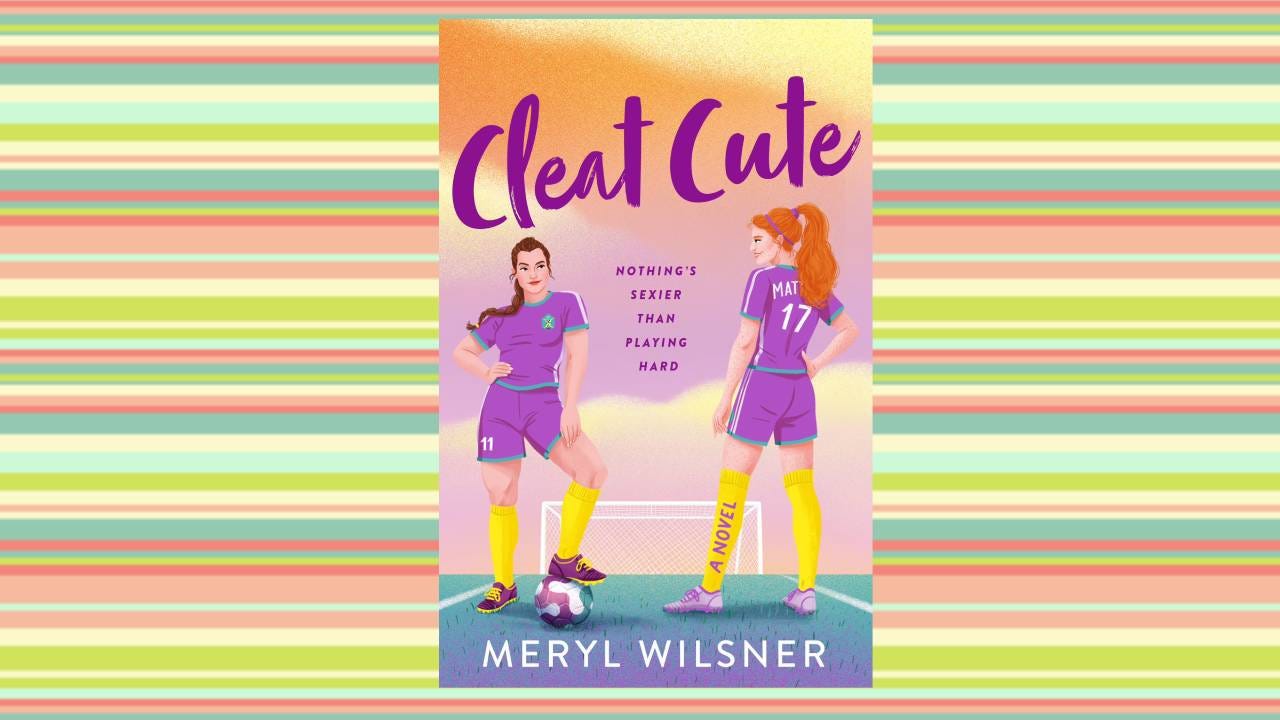'Cleat Cute' is a Trope-Filled Delight
A little miscommunication never hurt anybody
This is the Sunday Edition of Paging Dr. Lesbian. If you like this type of thing, subscribe, and share it with your friends. Upgrade your subscription for more, including weekly dispatches from the lesbian internet, monthly playlists, and a free sticker.
If there’s one thing romance readers love, it’s a well-used trope. When deployed cleverly, tropes can spark gleeful recognition among readers, encouraging desire, identification, and thrilling suspense. Lesbian and queer readers – especially fanfic lovers – are well-versed in romance tropes, which seep into all aspects of pop culture fandom. (If you’ve ever witnessed thirsty fans waxing poetic about blonde/brunette couples or height differences, you know what I mean.)
In Meryl Wilsner’s new sapphic romance, Cleat Cute, tropes abound. Set in the world of professional women’s soccer, the book follows two players who couldn’t be more different. Though only 26, Grace is a veteran player and the team’s captain. She’s reserved, stalwart in her dedication to the sport, and content with her solitude. Phoebe is a rookie player bursting with energy, enthusiasm, and jokes for days. Despite Grace’s best efforts to keep distance between them, Phoebe breaks down all of her walls and they embark on a passionate – albeit undefined – affair.
It’s a classic story of opposites attract. Their personalities are the most obvious difference, but it doesn’t stop there. Phoebe has at least six inches on Grace, and her fiery red hair stands out against Grace’s dark brown locks. (And yes, their height difference does come up during sex.) Though it’s not actually an age-gap romance like Wilsner’s last book, Mistakes Were Made, Grace’s status as a veteran superstar and Phoebe’s as a rookie – and a longtime fan of Grace’s – give the story a hint of that provocative power dynamic.
When it comes to “representation,” that slippery concept that tends to elide nuance, Cleat Cute finds a tricky balance between discussing identity and letting the characters exist without incessant definition or explanation. It seems clear that Wilsner wrote the book primarily for a queer audience, though they don’t omit the significance of the characters’ queerness either. (The utility of being “out” as a public figure is discussed several times.)
When identity does come up, it serves to deepen our understanding of the world and its characters. Grace and Phoebe have a non-binary teammate, which is true to the world of women’s sports. Phoebe’s brother is trans, and his need for top surgery weighs on Phoebe’s mind as she deals with financial struggles. Grace suggests that Phoebe may have ADHD, and their conversation about it takes up a significant portion of the book’s latter half. (It’s also subtly suggested that Grace may be on the Autism spectrum, though that’s up to the reader to decide.)
Wilsner understands the world of queer and lesbian culture, particularly online fan culture, and it shows. When Grace is trying to better understand ADHD so she can talk with Phoebe about it, she goes on ADHD TikTok. Phoebe references Grace’s thirsty online fandom, discussing a thread on the L Chat about a suit she wore to the ESPYs (also true to life). IRL superstars like Abby Wambach and Briana Scurry come up a few times, though the focus is on these fictional characters and their team.
The most controversial element in the book is also one of its central tropes: miscommunication. Fans have strong (often negative) opinions about miscommunication as a plot device, but Wilsner manages to make it work. In an interview with Autostraddle, they defend their use of the trope, noting that “People miscommunicate all the fucking time!” Though the characters in the book struggle to communicate, it’s also made clear why their wires get crossed so often. As evidenced by the novel’s attention to neurodivergence, Grace and Phoebe’s brains function in wildly different ways, which explains why they come at the process of communication from distinct perspectives.
Wilsner contends that this sort of romantic confusion is almost endemic to lesbians and queer folks. “We’re all stupid and don’t know what we want!” they joked in the same interview. Wilsner calls this trope “idiots-to-lovers,” and explains that this is what much of their work comes down to. “They’re just idiots in different ways,” Wilsner said of Grace and Phoebe’s tendency to miscommunicate.
Because of the book’s focus on the internal worlds of these two women, there is little in the way of external obstacles or conflict when it comes to the plot. Grace and Phoebe mainly struggle with their own self-doubts and existential turmoil, issues many readers can relate to. Though set in the exciting world of women’s soccer, the characters' journeys are fairly ordinary, and surprisingly moving.
Wilsner describes their literary endeavor as “writing happily ever afters for queer folks who love women.” While this focus on happy endings has become something of a trope in and of itself within lesbian and queer media, it’s still a widely desired outcome. In Cleat Cute, these characters’ quest for a happy ending draws the reader in, suggesting that such moments of queer joy are not so far out of reach for the rest of us. As far as tropes are concerned, it’s a damn satisfying one.



